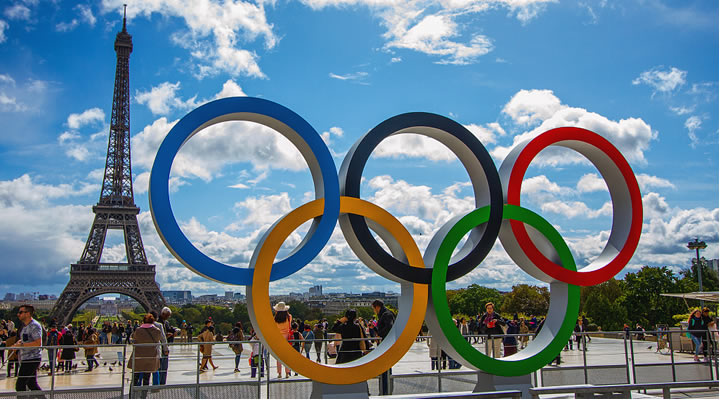
Assurances have been made by the organizers of the 2024 Paris Olympics to take groundbreaking climate actions. This includes reducing the carbon footprint of previous Games by half and funding projects aimed at curbing greenhouse gas emissions that contribute to global warming.
Despite these promises, experts remain wary, particularly after the organizers decided against setting a strict limit on the overall carbon impact of the event.
It is anticipated that about one-third of the emissions generated during the three-week event will stem from transportation, with millions of athletes, spectators, staff, and journalists traveling to Paris.
The organizers chose to utilize mostly pre-existing or temporary infrastructure for the event, thus avoiding the substantial environmental impact associated with carbon-intensive building materials like concrete and steel.
However, the sustainability claims of the Games were questioned when the initial commitment to establish a specific cap on emissions at 1.58 million tonnes of CO2 equivalent was discarded.
According to Martin Muller from the Institute of Geography and Sustainability at Lausanne University, “The quantified target, which was a significant step forward compared to previous Games and was announced with great enthusiasm, has now been abandoned.”
“Without a set goal, there is no verifiable obligation,” Muller added.
Instead of a specific target, the organizers pledged that the Olympics would produce half the average emissions of the 2012 and 2016 Games in London and Rio de Janeiro. Muller noted that this would equate to 3.9 million tonnes of CO2.
Muller also pointed out that Paris 2024 could “emit 1.95 million tonnes and still claim to have met their target,” despite this being “an increase of over 20 percent compared to the initial goal.”
– Climate Contribution –
The organizers stated that the Games would have a “positive contribution to the climate” through the acquisition of carbon credits. These credits offset pollution by supporting initiatives that lower or prevent greenhouse gas emissions.
The wording of this commitment was revised following criticism. The organizers now state that the Games will “back climate contribution projects that reduce and capture CO2 emissions equivalent to the unavoidable emissions generated by the Games.”
These projects may involve activities such as forest preservation, tree planting, or the promotion of renewable energy. However, no further details were provided by the organizers.
Kaya Axelsson from the Smith School of Enterprise and the Environment at the University of Oxford commended the altered phrasing, saying that framing investments in credits as ‘climate contribution’ rather than offsets helps maintain transparency regarding the organization’s carbon footprint while supporting initiatives aligned with global net-zero goals.
Meanwhile, Benja Faecks from Carbon Market Watch emphasized that carbon credits should be utilized to endorse worthwhile projects, not to “compensate for emissions.”
Past evaluations by Carbon Market Watch revealed that the Games’ climate strategy was deemed “incomplete and lacking in transparency,” citing the absence of comprehensive methodologies and monitoring.
– ‘Unjustified Plastic Pollution’ –
Activists have raised concerns about the excessive plastic waste during the Games and the involvement of major sponsor Coca-Cola.
Under pressure, organizers announced plans to distribute an estimated 9.6 million beverages from fountains or glass containers, pour 6.2 million drinks into reusable cups, and provide athletes with 2.2 million recycled plastic bottles.
France Nature Environnement (FNE), a coalition of advocacy organizations, accused Coca-Cola of contributing to “unjustified plastic pollution” and criticized the decision to serve drinks from recycled plastic bottles in reusable plastic cups as a form of deception.
“Merely recycling is not a solution; Coca-Cola should have reduced its plastic usage,” stated Axele Gibert from FNE in an interview with AFP.
In 2023, Coca-Cola topped a list of brands identified as the worst contributors to plastic pollution according to an analysis conducted by the NGO Break Free From Plastic, based on waste collection data from 41 countries.
– Greener Games –
Experts like Muller have proposed measures to enhance the sustainability of the Olympics.
In a study published in Nature Sustainability in 2021, Muller and co-authors suggested strategies such as “significantly reducing the scale of the event, rotating the Olympics among the same cities, and enforcing independent sustainability standards.”
To reduce air travel, the NGO The Shifters recommended prioritizing local spectators and those from neighboring countries with less carbon-intensive travel. They also proposed setting up decentralized fan zones managed by the host country in various continents to cater to spectators traveling shorter distances.
AFP
